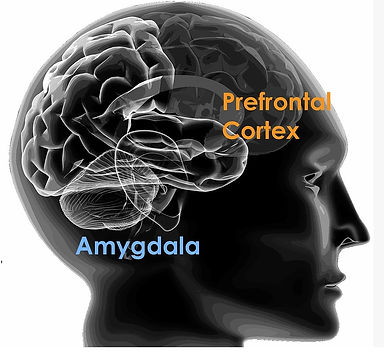How the Brain Works
The Goal is to optimise your Decision Making Quotient at the precise moments you need to make key decisions which affect your chances of success.
The Facts
We can’t stop negative or anxious thoughts, we can only manage them.
We Feel first, and then we Think, not the other way around.
We manage emotions and thoughts through Behaviours and by creating Memories which can be recalled when needed
The Brain is complex, so we need to use clever methods to manage it.
You can produce Chemicals in your Brain which will help calm your emotions, and allow your Decision Making Brain to use skills, knowledge and good memories.
There is a nerve called the Vagus Nerve which is the longest nerve in your body. Stimulating this nerve can actually help you relax.
The part of the Brain which causes us to be anxious or think negatively is the Amygdala. This alerts us to potential threats, and was pretty important in ancient times when the main concerns were sabre-tooth tigers!


Our DMQ uses Two Brains!
We need both Brains to function and be happy.
The Frontal Cortex (Decision Making Brain) when we need to make key Decisions and determine if there is real danger.
The Amygdala (Emotional Brain) when there is a real danger or we need to be wary and should check out the situation.
DMQ Coaching provides techniques to "calm" the Emotional Brain when it triggers an Alarm, and prevent it from hi-jacking our decision making.
Brain Chemicals
We have chemicals in our Brain which affect our thought processes and how we react to situations. DMQ Coaching provides techniques which can be put into practice during training, in preparation for and during a Performance activity to help manage these brain chemicals and optimise your DMQ.
The following are they key brain chemicals you need to be aware of:
Serotonin: plays a role in the dynamics of pride, loyalty, and status. When we feel a sense of accomplishment or recognition from others, we are experiencing the effects of serotonin.
Oxytocin: affectionately referred to as the “hugging drug” because it is released by the brain during physical contact with others. It’s also the feeling behind love, friendship, or deep trust.
Endorphins: essentially released in response to pain. They help us push our bodies beyond their comfort levels and persist when we might otherwise want to give up.


The Vagus Nerve
The Vagus Nerve is the longest nerve in our body and is responsible for a number of key functions. It extends from our lower stomach to our brain.
One of the key functions of the vagus nerve is to produce serotonin when stimulated in order to help manage the "Fight or Flight" alarm triggered by our Emotional Brain.
By using a technique called Diaphragmatic Breathing the vagus nerve can be stimulated, and very quickly help calm the Emotional Brain so that our DMQ is optimised.
About the Research
John is not a qualified Sports Psychologist, but is fascinated by how the brain functions and how it can be managed in High Performance Sport.
The information gathered and used in DMQ Coaching is publicly available to all. However the benefit provided by DMQ Coaching is in summarising the information available, and based on 25+ years experience designing practical applications of methods rather than just talking in theories.